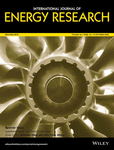Development and evaluation of an integrated solid oxide fuel cell system for medium airplanes
Summary
This paper concerns a solid oxide fuel cell (SOFC) based integrated powering system for a medium-sized airplane and analyzes it thermodynamically for its performance assessment and evaluation. It further investigates the system in relation to aircraft operating conditions and provides the conceptual solutions for heating and cooling at various temperatures. The results of the energy and exergy analyses and performance assessments of the proposed integrated system are presented and discussed. The exergy and energy efficiencies of the main components are calculated and observed for the SOFCs with the maximum values of 84.54% and 80.31%, respectively. The present integrated system has overall energy and exergy efficiencies of 57.53% and 47.18%, respectively. Furthermore, it is found that an increase in the reforming temperature ratio can improve the hydrogen yield. However, when the system is operated at a temperature higher than 800°C, the hydrogen yield decreases since a reverse water gas shift reaction is more pronounced. Moreover, the SOFC shows the best performance at 800°C with a maximum power density of 1.23 W/cm2.




